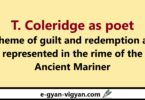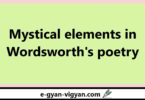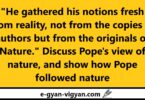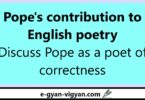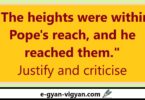
Poetic diction of Wordsworth | Confessional elements in words worth’s poetry with reference to the poem prescribed in your course
Poetic diction of Wordsworth
Introduction-
Wordsworth’s entire poetry subjective and pervasive. Personal note pervades throughout his poetry. Where it is Nature poetry or poetry on man or child or his reflective or mystic poetry, the subjective element is present invariably. Even as a critic his approach is purely subjective.
His conception of Poetry-
His poems conform to this dictum. When we read his poems. It appears as if were confessing again and again that what he is expressing at the moment he had already experienced it long before and contemplated upon it in tranquillity. In his most famous poem, Tin tern Abbey’ he writes:
“Through a long absence, have not been to me
As is a landscape to a blind man’s eyes;
But oft, in lonely rooms, and amid the din
Of towns and cities, I have owed to them
In hours of weariness, sensations sweet,
Felt in the blood, and felt along the, heart;
And passing even in to my pure mind,
With tranquil restoration.”
In the poem, ‘My Heart Leaps up’, Wordsworth writes:
“My heart leaps up when I behold
A rainbow in the sky;
So was it when my life began;
S is it now I am a man;
be it when I shall grow old
Or let me die.”
All these lines point out to the confessional element in Wordsworth’s poetry. Going much deeper in his famous poem, Tintern abbey, and ‘we are told by Wordsworth himself about the four stages of his love of nature. In the first stage he bound over the mountains like a row. The sounding cataract haunted him like a passion. And then, “That time is past. And all its aching joys are now no more” But, then he is not sorry for this change. Other gifts have followed.
“I have learned to look on natures, not as in
the hour of thoughtless youth”
Now Wordsworth hears in nature. “The still, sad music of humanity.” Then he confesses that now feels
“A presence that disturbs me with the joy”.
Of elevated thoughts, a sense sublime”
And then he confesses that he owes to those beauteous forms that “Blessed mood in which the affections gently lead us on” until the breath of this body is almost is suspended and we become a living soul.
Subjectivity-
As has been pointed out earlier his entire poetry is subjective. He expresses what he feels and experiences with the courtage of conviction. He called himself a worshipper of nature, a high priest of nature. His acceptance of everything is in all respects religious, which amounts to confession. He establishes communion with the soul of Nature and what he feels he sincerely expresses which is very much like a confession. And that directly or indirectly becomes his didacticism, his moral teaching.
Didacticism: Moral teaching: Religious attitude-
The greatest quality of Wordsworth as a poet is that he is the most sincere poet; he conceals nothing from his readers. He shares his experiences, his feelings, emotions with all in the manner he himself experienced. And this he does in the language of the common people. His sincerity, his honesty, his simplicity add immen self to the confessional elements in his poetry.
Wordsworth feels, experiences, and then sings:
“One impulse from a vernal wood
May teach you more of man
Of moral evils and of good
Than all the sages can.” (The Tables Turned)
In ‘Lines written in Early Spring’ he writes;
“And’ testy faith that every flower
Enjoys the air it breathes.”
In ‘Immortality Ode’, he writes;
“To me the meanest flower tht blows can give
Thoughts that do often lie too deep for tears.”
High Priest of Nature – Preacher-
Wordsworth was a high priest, a worshiper of nature. It was his deep sense of religion, his religion of the worship of nature that made him feel as if he were not paying his proper attention toward nature.
In ‘The world is too much with us’, he says:
“The world is too much with us, late and soon,
Getting and spending, we lay waste our powers;
Little we see in nature that is ours
We have given our hearts away, a sordid boon.”
Wordsworth feels some sort of guilty. A sense of guilt torments him.
He confesses it and then says-
“Great God-I’d rather be
A pagan suckled in a creed out worn”
Conclusion-
Thus, we see that even in poems outside the grow up of his numerous Nature poems, the sense of some sort of negligence of duty somewhere, in one way or the other is there, and word swath does confess it very sincerely and honesty and is prepared to make amends for it. The confessional elements in the poetry of wordsworth are not his weakness. There lies his greatest strength. It was this intensity of feeling that made him a great poet.
English – Important links
- Hero of ‘Paradise Lost’ | Hero of Milton’s ‘Paradise Lost’ | Who is the hero of ‘Paradise Lost’
- A note on Milton’s Grand style
- Paradise Lost as a classical Epic | How does Milton employ classical epic convention in his Invocation in paradise last Book.
- “The heights were within Pope’s reach, and he reached them.” Justify and criticise
- If Pope be not a poet, where is poetry to be found?” Comment on this judgment of Johnson on Pope
- Pope’s contribution to English poetry | Discuss Pope as a poet of correctness
- “He gathered his notions fresh from reality, not from the copies of authors but from the originals of Nature.” Discuss Pope’s view of nature, and show how Pope followed nature
- Supernatural machinery of ‘The Rape of the Lock’
Disclaimer: e-gyan-vigyan.com is created only for education purpose and education sector. We only provide links and materials already available on the Internet. If in any way it violates the law or there is any problem then please mail us- vigyanegyan@gmail.com

